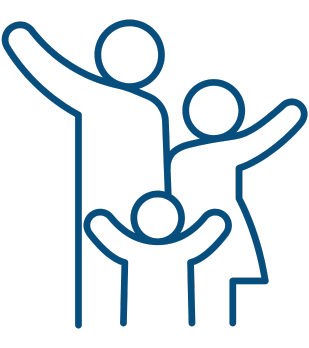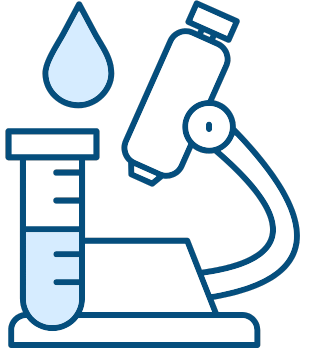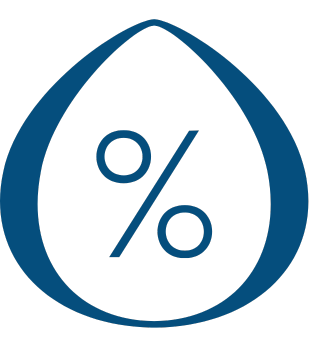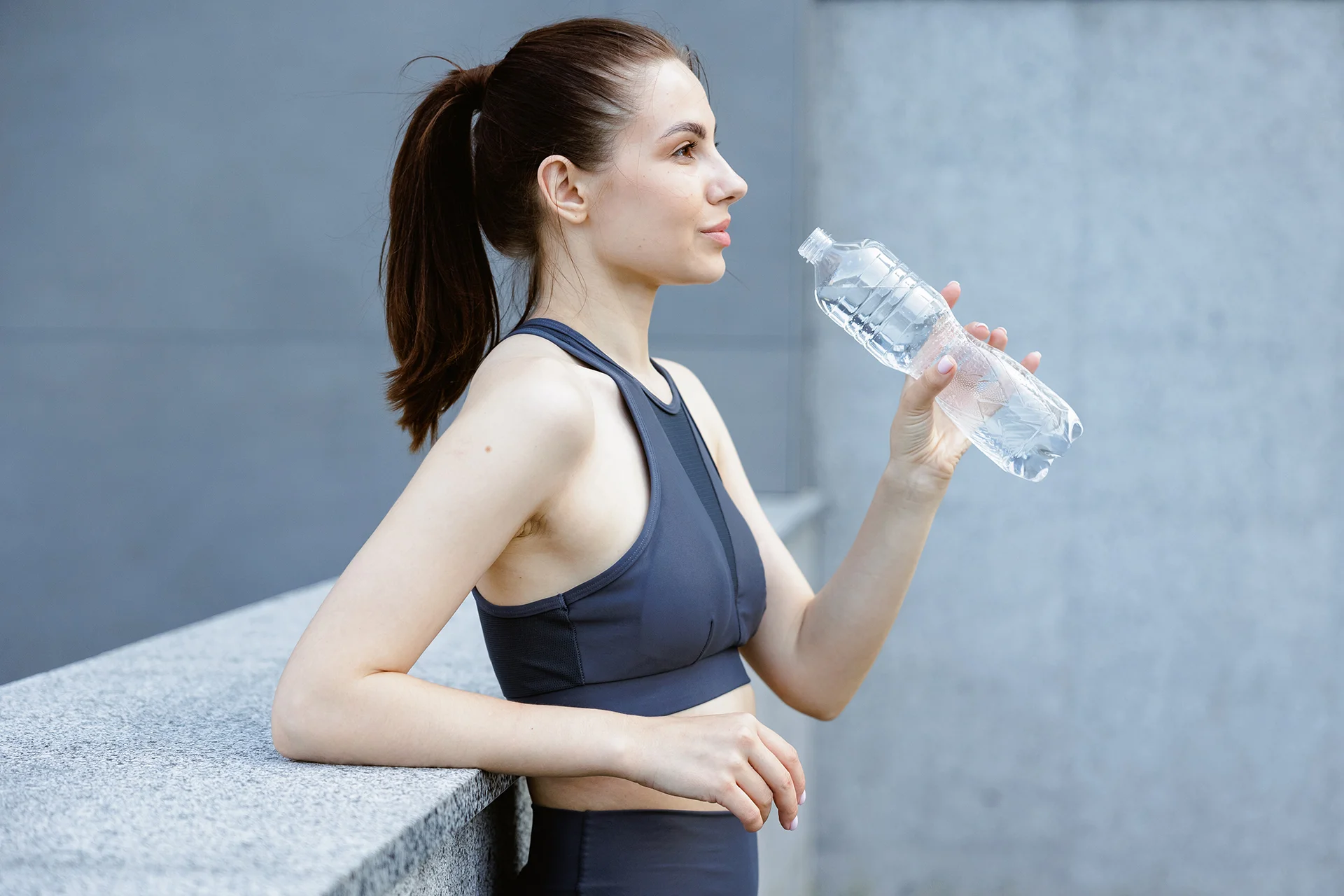Every year, we welcome the summer sunshine and hot temperatures, because they bring with them reminders of carefree summer days spent on the beach, improved mood and warm summer evenings in nature, but sometimes this happy harmony and carefree nature can be disrupted by dehydration, a subtle but important disorder of the body.
No doubt you’ve heard of dehydration, but do you really know what it means and what the signs are? In this article, together with our clinic specialists, we will look at the effects of dehydration on the body, analyse the signs in detail and offer practical tips on how to effectively prevent this condition.
Dehydration – what is it?
Dehydration is a condition in the body where there is a lack of sufficient fluid for the normal functioning of the body. Fluids are essential for many processes in the body, including metabolism, blood circulation and temperature regulation. When the body loses more fluid than it takes in, dehydration can occur.
Most of the fluid lost during dehydration is water, and small amounts of salts (sodium, potassium, calcium, magnesium, etc.) are lost with water. We naturally waste water every day through exhaled air, sweating, urination and defecation, but by consuming enough water, our body is able to maintain a proper fluid balance.
As dehydration develops, the amount of minerals (electrolytes) that the body needs decreases. Dehydration can lead to a number of different disorders in the body. The skin may become dry and rough, headaches, fatigue and reduced concentration may occur. Urination may be reduced and urine may become darker than normal. In addition, thirst and dry mouth may occur. In severe cases, there may be impaired consciousness.
The consequences of dehydration can vary depending on the level of dehydration and the condition of the body. The most dangerous is severe dehydration, which can lead to serious health complications such as kidney problems or even heart problems.
Dehydration is considered to be at the limit when 1.5% of the body’s water is lost.
Causes of dehydration
There are a number of different causes that lead to dehydration. The causes of dehydration can vary, but are most often related to the factors listed below, physiological conditions, diseases and nutritional disorders.
Environmental factors
High ambient air temperature, hot or dry air, excessive sweating when exercising or sunbathing, ineffective protection of the body against high ambient temperatures, inadequate leisure or work clothing, prolonged wearing of a respirator or a gas mask, prolonged physical activity, use of certain medications.
These factors increase the body’s loss of fluid through the skin and respiratory tract. If these losses are not taken into account and sufficient water or other fluids are not consumed, dehydration can develop.
Physiological states
Diarrhoea, vomiting, high body temperature (fever), increased heart rate or rapid breathing, extreme and frequent urination, certain chronic illnesses (diabetes, heart disease, kidney disease), inability to drink or to drink on your own (when you are in a serious condition or in a coma, or as a result of a lesion or infection in the mouth or oropharynx, or injuries to face or teeth).
These conditions can be associated with various diseases or infections, and can also increase fluid loss through the gastrointestinal tract or sweating. In addition, these conditions can disturb the fluid balance in the body and make it more difficult to prevent or treat dehydration.
Infectious diseases
Food poisoning, rotavirus and norovirus, cholera, gastroenteritis, dysentery or other intestinal infections, kidney and urinary tract infections.
These diseases cause severe diarrhoea and vomiting or frequent urination. These diseases can also affect the electrolyte balance in the body and cause hyponatraemia (sodium deficiency) or hypokalaemia (potassium deficiency), which further aggravate symptoms and complications of dehydration.
Eating disorders
Inadequate fluid intake, consumption of caffeinated or alcoholic beverages, consumption of sugary drinks or unhealthy foods, prolonged lack of adequate water and food.
These disorders can affect the fluid balance in the body and lead to dehydration, either through diuretic (urinary stimulating) effects or by reducing fluid intake. Caffeine intensifies the elimination of fluids by the kidneys. In addition, these disorders can lead to dehydration due to insufficient intake of water or electrolytes (e.g. sodium, calcium, magnesium), which are essential for maintaining the body’s fluid balance and functions.
Symptoms of dehydration
Dehydration is a condition in which the body loses more water than it gains. Water is vital for all bodily functions, so dehydration can cause serious health problems. Signs of dehydration can be mild or severe, depending on the amount of water in the body and how quickly it is lost. The main symptoms of dehydration are:
- Dry mouth and lips. This is one of the first and most common signs of dehydration. It indicates that the body is lacking fluid and is trying to reduce its loss through saliva production. At the same time, the tongue may feel swollen and dry.
- Dry skin. Dry skin is a good sign of sufficient or insufficient fluid in the body. Dehydrated skin becomes dull, wrinkles become more pronounced and dark circles appear under the eyes.
- Strong, prolonged thirst. This is a key signal of a lack of fluid in the body. You should be particularly worried if you have a very strong and prolonged thirst. However, you should not wait until you are thirsty – try to drink enough water every day.
- Bad breath. One of the possible causes of bad breath is insufficient fluid intake. If you have not been drinking enough water recently, you may start to have bad breath. This is because saliva has antibacterial properties, and when the amount of saliva decreases (due to a lack of fluids in the body), bacteria start to multiply, which leads to bad breath.
- Dizziness, pain. When the body’s fluid content decreases, the brain is less supplied with blood and dizziness occurs. Headache is one of the most common symptoms of dehydration, caused by the reaction of the small blood vessels in the brain to the loss of fluid in the body.
- General weakness. This is a common symptom of dehydration and indicates that the body lacks energy and strength. Weakness may be felt in the muscles, arms, legs or the whole body. It can make it difficult to move, speak or do other activities.
- Decreased urine output or darker colour. Urine is another important indicator of the onset of dehydration. It shows that the body is trying to conserve fluids and concentrate urine. Reduced fluid in the body can lead to reduced or no urge to urinate, reduced urine volume and discoloured urine. The volume of urine may decrease to less than 500 ml per day and the colour may turn yellow or brown. This symptom can be dangerous for the kidneys and require urgent medical attention.
- Reduced blood pressure. This is another possible sign of dehydration that can be dangerous to health. It indicates that blood circulation is impaired and that there is insufficient oxygen and nutrient supply to organs and tissues.
- Chills. Dehydration can also cause chills. Water traps heat, so it is harder for the body to regulate temperature when it loses fluid. In addition, during dehydration, the body begins to restrict blood flow to the skin. This causes chills, even in warm environments.
- Muscle cramps. When the body lacks fluids, blood circulation slows down, which can lead to muscle cramps. Excessive excretion of sodium and potassium can also contribute..
- Constipation. When the body does not get enough water, constipation occurs because the body needs enough water to move all the contents easily through the colon. When there is insufficient fluid in the body, the body compensates by removing more fluid from the stool, making it harder to pass.
- Increased need for sweets. Sometimes, dehydration and thirst can hide under a feeling of hunger. When there is a lack of fluid, glycogen is used up, leading to a greater need for sweets. In particular, sugar cravings become more pronounced as the body starts to run out of fluids and glycogen or stored carbohydrates are used more quickly.
- Fatigue, irritability. Dehydration causes our bodies to lack energy, we start to feel tired and lethargic, irritable and irritable.
Remember that these symptoms can occur to varying degrees, and even one or more of these symptoms can be a warning sign of dehydration in the body. If you have any doubts or serious health problems, it is always best to seek medical advice.
When should I seek help from health professionals?
Dehydration in general is extremely dangerous. A lack of water in the body leads to organ dysfunction. Therefore, it is always better to take precautions and seek medical help as soon as you feel the symptoms of dehydration. Signs to seek medical attention:
- nausea and vomiting for more than 24 hours;
- fever with a body temperature of +38.5 °C or more;
- diarrhoea lasting more than 2 days;
- sudden weight loss (more than 1.5 % of body weight) within 24 hours
- decrease or disappearance of urine output;
- severe weakness;
- sluggishness or sudden loss of consciousness;
By analysing the results of laboratory tests and taking a detailed history, the doctor can determine the degree of dehydration and its causes. The most important goal is not only to identify dehydration, but also to find the underlying cause of dehydration.
Ways to prevent dehydration
Water is vital for us to maintain the proper functions of the whole body. Therefore, when there is not enough water in our bodies, serious health problems can arise. Preventing dehydration is the best way to avoid its complications and maintain an optimal fluid balance in the body. Here are some ways to prevent dehydration:
Intravenous therapy
Intravenous therapy is a procedure where a solution containing water and electrolytes (e.g. sodium, calcium or magnesium) is injected into a vein. This method can be used in cases of severe dehydration or when you are unable to drink fluids due to vomiting, diarrhoea or other reasons. Intravenous therapy has several advantages: it ensures rapid and accurate replenishment of fluids and electrolytes, so that excellent well-being is quickly restored; it reduces the load on the gastrointestinal tract; and it helps to prevent complications.
Adequate fluid intake
This is the most basic and simplest way to prevent dehydration. The amount of fluid the body needs depends on various factors such as body weight, gender and physical activity. However, it is recommended to drink at least 2 litres of water a day, or more if you are hot, sweaty or sick. Fluids can be more than just water, sometimes tea, juice, milk or other non-alcoholic and non-sweetened beverages are also suitable.
Minimum caffeine and alcohol content
Alcohol and caffeine are diuretics – substances that stimulate the production and excretion of urine. Their use can therefore cause dehydration or worsen an existing condition. Especially avoid alcohol and caffeine when it is hot. Alcohol also impairs the ability to detect early symptoms of dehydration or overheating.
Changes in urine
The colour of the urine can indicate the level of hydration: the lighter the colour, the better hydrated the body is; the darker the colour and the lower the urine volume, the more deficient the body is in fluid. If the urine is yellow or brown, you need to start drinking more fluids.
Clothing suitable for the environment
Sweating is the body’s way of regulating temperature and getting rid of excess heat. However, sweating also means a loss of fluids and electrolytes, which can lead to dehydration. You therefore need to adapt to the environmental conditions and take some measures to reduce sweating and maintain hydration. Appropriate clothing helps to reduce body temperature and sweating. It is recommended to wear clothes made of natural fibres (e.g. cotton, linen) that allow air to circulate and do not cause skin irritation. Synthetic or dark clothing, which can cause increased sweating, should also be avoided.
Prevention on hot days
In hot weather, plan your activities well and always take water with you. Drink regularly in small sips. Liquids should not be too cold. If possible, postpone all outdoor activities in the heat and avoid vigorous physical activity. If the heat becomes unbearable, place a towel dampened with room temperature water on your head and shoulders or spray yourself with lukewarm water to cool your body and maintain a comfortable body temperature.
Dehydration is a condition in which the body loses more fluid than it gains. Dehydration is not simply thirst; persistent fluid insufficiency can lead to a drop in blood pressure, kidney failure and other serious health complications. It is therefore very important to drink enough water and avoid excessive sweating, especially on hot days or during sports. If you start to experience symptoms of dehydration, such as headaches, dry mouth, persistent thirst, contact our clinic immediately – we can help you quickly restore fluid and electrolyte balance and improve your well-being with the help of drips.




